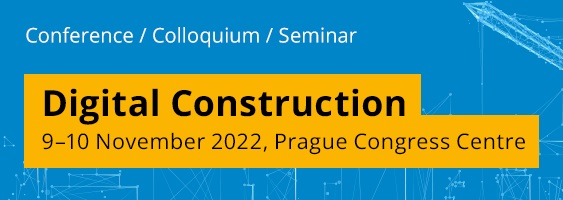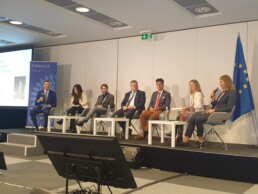Digital Construction Conference 2022 – Towards Construction 4.0 and the future of this sector in the digital era

On November 9th and 10th, the president of IBIMI-buildingSMART Prague participated in the "Digital Construction conference” organized by the Czech Ministry of Industry and Trade in Prague, in collaboration with buildingSMART Czech Republic, with the goal to outline the possible development paths of the sector towards Construction 4.0 .
Many representatives of buildingSMART International and of the individual national chapters attended the conference, confirming the importance of the role played by our community in the digital transformation of the building supply chain.
The construction industry is still the least digitized sector of all and, at the same time, one of the largest contributors to GDP in all European countries. Add to this the stagnant levels of labor productivity and the urgency of undertaking profound changes becomes evident.
The main purpose of this meeting was to find new solutions to stimulate the flow of data in the sector and accelerate construction processes through Building Information Modeling (BIM) and improve the technological and data ecosystem of the construction industry.
No less important, the other topics discussed included the introduction of digital transition and BIM in the public sector, the revolution in the acceleration of building permit processing, robotization, automation and prefabrication in the construction ecosystem.



The good news is that much-needed change is already underway. After decades of under-digitalization, the construction sector seems ready to start a new era. New analyzes of the construction technology ecosystem uncover emerging trends, solutions, and a growing universe of technology use cases that are revolutionizing the way we plan, design, and execute construction projects.
The development of robotics and 3D printers will be solutions not only to the lack of workforce in the construction industry but also to problems related to the safety of workers. For instance, for the reconstruction interventions in risk areas, a "hot" topic also supported by the CECE (Committee for European Construction Equipment https://cece.eu/) in relation to the recent events in Ukraine.
The discussion with Katharina Knapton-Vierlich, the new representative of DG Growth H1 construction, on "digital transition and BIM in the public sector", was very interesting. The goal is to identify a common digital development strategy between the Member States and the European Commission, which would support it with specific funding programmes. Topic of extreme relevance for buildingSMART. For this reason, the dialogue started in Prague will be deepened with the Commission during the buildingSMART summit to be held in Rome next March.

Extremely interesting was also the European Commission initiative on the Digital Building Logbook, with the goal of promoting transparency and greater availability of data for a wide range of market operators (property owners, tenants, investors, financial institutions and public administrations). The idea is to provide a guideline that catalogs and stores all the information deemed important for a Digital Building File in a format that synchronizes the methodologies used in the various member countries, also through R&I projects for the implementation of the Digital Register financed by the Commission.
At the end, it was also discussed the impact of this transformation on human resources, focusing in particular on training. The digitization of the supply chain must not be perceived as a threat by workers in the sector, but recognized as a way to improve the image and the working conditions in the industry. The right training courses and the right skills will in fact make the sector more attractive to younger workers. And it is precisely in this direction that buildingSMART International is going with the work at the tables of the Professional Certification Program (PCERT), the professional qualification program designed to provide a certificate compliant with local regulations and at the same time having international validity on skills in the BIM and openBIM.
Many of the points raised during the conference in Prague will be the subject of further debate and study at the buildingSMART International Standards Summit in Rome. We invite you therefore to continue following us and to join us on the occasion of the Summit.
SAVE THE DATE: buildingSMART International Standards Summit - Auditorium della Tecnica, Rome – 27/30 March 2023
Giulia Riccardi
Anna Moreno
Caterina Nissim
New Guideline on the use of BIM for energy performance
The current global warming trend is greater than the 1.5 degrees value established during the Paris climate change summit. World leaders reiterated the need to halve emissions over the next decade and reach net zero carbon emissions by mid-century to limit global temperature rise to 1.5 degrees.
The result of this policy is leading to the construction of new buildings with very high performance, but there is a strong need to improve the energy performance of the existing building stock.
Integrating BIM into national climate-change and energy policies is necessary and challenging, as many of these buildings lack reliable information, which BIM can help generate, exchange and, most importantly, archive so that they can be used in the future regardless of the software that generated them. The use of open standards is therefore not an option but an obligation.
The working group on energy efficiency active within IBIMI (Institute for BIM Italy), the Italian chapter of buildingSMART International, worked on the drafting of guidelines on how BIM can contribute to improving energy performance in each phase of the life cycle of a building
The guidelines can be downloaded free of charge from the websitewww.buildingsmartitalia.organd will be used as Body of Knowledge for buildingSMART International Qualification Program on Energy Performance.
We would be grateful if you take a few minutes to answer to a survey on the use of BIM to improve the energy performance of buildings. This will help us to draw the roadmap on the competences needs. At this link the survey:https://docs.google.com/forms/d/e/1FAIpQLScaXQ5eD_FI7AUcs0_C0v3DcdgH5_XDSNMZbVS2vEoju_ixZg/viewform

